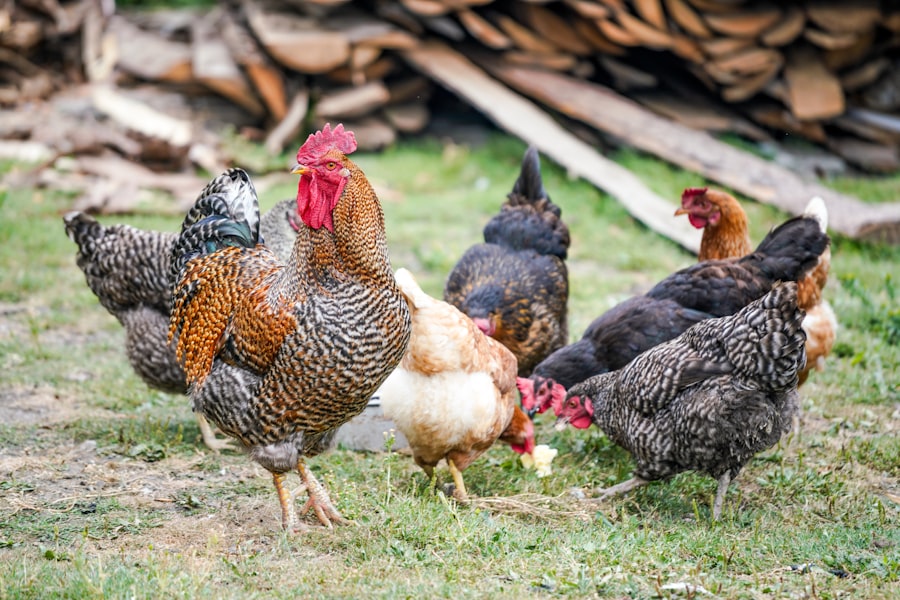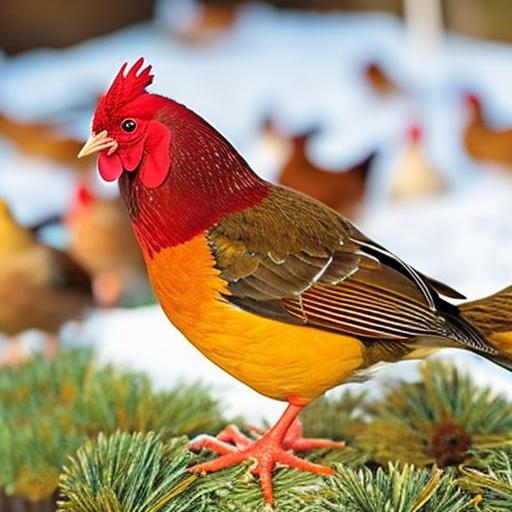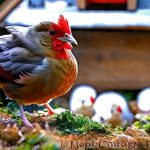Keeping chickens warm in winter is an important aspect of responsible chicken ownership. As the temperatures drop and the days become shorter, it is crucial to ensure that your feathered friends are well taken care of during the colder months. Neglecting to provide them with a warm and comfortable environment can lead to serious health issues, such as frostbite and illness. In this article, we will discuss the importance of keeping chickens warm in winter and provide tips on how to do so effectively.
Key Takeaways
- Keeping chickens warm in winter is crucial for their health and well-being.
- Understanding your chickens’ needs and preparing their coop accordingly is essential.
- Insulating the coop and providing adequate ventilation are both important for regulating temperature.
- Heat lamps and heaters can be used, but must be used safely and with caution.
- Choosing the right bedding material and monitoring your chickens’ health and comfort are also important factors to consider.
Importance of Keeping Chickens Warm in Winter
Keeping chickens warm in winter is essential for their overall well-being. Chickens are susceptible to cold temperatures and can suffer from frostbite if not adequately protected. Frostbite occurs when the chicken’s comb, wattles, or feet are exposed to freezing temperatures for an extended period. This can lead to tissue damage and even amputation in severe cases.
In addition to frostbite, chickens are also more prone to illness during the winter months. Cold temperatures weaken their immune system, making them more susceptible to respiratory infections and other diseases. By providing them with a warm and dry environment, you can help prevent these health issues and ensure that your chickens stay healthy throughout the winter.
Understanding the Needs of Your Chickens
To effectively keep your chickens warm in winter, it is important to understand their specific needs during this time. Chickens require a warm and dry environment to thrive, especially when temperatures drop below freezing. They need protection from drafts, as cold air can quickly chill them and lead to health problems.
It is also crucial to provide your chickens with adequate space in their coop during the winter months. Overcrowding can increase moisture levels and make it harder for chickens to stay warm. Ensure that each chicken has enough space to move around comfortably and that there are no overcrowding issues.
Preparing the Chicken Coop for Winter
Preparing your chicken coop for winter is an essential step in keeping your chickens warm. Start by thoroughly cleaning the coop, removing any droppings or debris. This will help prevent the buildup of moisture, which can lead to dampness and cold drafts.
Inspect the coop for any damage, such as holes or cracks, and repair them promptly. These openings can let in cold air and drafts, making it harder for your chickens to stay warm. Use caulk or weatherstripping to seal any gaps and ensure that the coop is airtight.
Insulating the Chicken Coop
Insulating your chicken coop is an effective way to keep it warm during winter. Insulation helps retain heat and prevents cold air from seeping in. There are several insulation options to choose from, including foam board and straw bales.
Foam board insulation is easy to install and provides excellent insulation properties. Cut the foam board to fit the walls of your coop and attach it securely. This will help keep the warmth inside and protect your chickens from the cold.
Straw bales can also be used as insulation. Stack them around the perimeter of the coop, creating a barrier against the cold. Straw bales provide natural insulation and can help maintain a comfortable temperature inside the coop.
Providing Adequate Ventilation

While it is important to keep your chickens warm, it is equally important to provide adequate ventilation in the coop. Good ventilation helps remove moisture and ammonia buildup, which can lead to respiratory issues in chickens.
To provide ventilation without letting in too much cold air, consider installing vents with adjustable covers. This will allow you to control the airflow while still maintaining a comfortable temperature inside the coop. Place the vents higher up on the walls to prevent drafts from reaching your chickens.
Using Heat Lamps and Heaters
Heat lamps and heaters can be used to provide additional warmth in the chicken coop during winter. However, it is important to use them with caution and follow safety guidelines.
Heat lamps should be securely mounted and positioned away from any flammable materials. They should also be placed at a height that prevents chickens from coming into direct contact with them, as this can lead to burns or fires.
Heaters can be used in larger coops to provide consistent warmth. Choose a heater specifically designed for chicken coops and follow the manufacturer’s instructions for safe usage. It is important to regularly check the heater for any malfunctions or damage.
Choosing the Right Bedding Material
Choosing the right bedding material is crucial for keeping your chickens warm and comfortable during winter. Straw, wood shavings, and sand are popular options that provide insulation and absorb moisture.
Straw is an excellent bedding material as it provides natural insulation and helps retain heat. It also absorbs moisture, keeping the coop dry and preventing cold drafts.
Wood shavings are another good option as they provide insulation and absorb moisture effectively. They are also easy to clean and replace when necessary.
Sand can be used as bedding material in the coop’s run area. It does not retain moisture, allowing droppings to dry quickly. Sand also provides a soft surface for chickens to walk on, reducing the risk of frostbite.
Feeding Your Chickens for Winter
Feeding your chickens a balanced diet is crucial during winter to support their health and keep them warm. Provide them with a high-quality layer feed that is specifically formulated for cold weather conditions.
In addition to their regular feed, consider supplementing their diet with cracked corn. Corn generates heat during digestion, helping to keep chickens warm from the inside out. Mealworms are also a great source of protein and can be given as treats during colder months.
Ensure that your chickens have access to fresh water at all times. Use heated waterers or regularly replace frozen water to prevent dehydration.
Monitoring Your Chickens’ Health and Comfort
Monitoring your chickens’ health and comfort is essential during winter. Keep an eye out for any signs of illness, such as coughing, sneezing, or lethargy. If you notice any abnormalities, consult a veterinarian promptly.
To keep your chickens comfortable, provide them with additional sources of warmth, such as heated perches or cozy nesting boxes. Regularly check the coop for any drafts or cold spots and make necessary adjustments to maintain a comfortable temperature.
Keeping chickens warm in winter is crucial for their health and well-being. By understanding their specific needs, preparing the coop, insulating it effectively, providing adequate ventilation, and using heat lamps or heaters cautiously, you can ensure that your chickens stay warm and comfortable during the colder months. Additionally, choosing the right bedding material, feeding them a balanced diet, and monitoring their health and comfort will contribute to their overall well-being. Remember to take the necessary steps to keep your chickens warm this winter and enjoy the benefits of happy and healthy feathered friends.
If you’re looking for the best ways to keep chickens warm in winter, you’ll definitely want to check out this informative article on poultrywizard.com. They provide valuable insights and tips on how to ensure your chickens stay cozy and comfortable during the colder months. In addition to practical advice, they also offer a range of helpful resources, including chicken coop run plans and recommendations for the Producers Pride Sentinel Chicken Coop. For more information on keeping your chickens warm this winter, be sure to visit their website: https://poultrywizard.com/keeping-chickens/producers-pride-sentinel-chicken-coop/.
FAQs
What temperature range is safe for chickens in winter?
Chickens can tolerate temperatures as low as 20°F, but it is recommended to keep their coop between 32°F and 50°F.
What are some ways to insulate a chicken coop?
Insulating a chicken coop can be done by using materials such as straw, hay, or wood shavings. You can also use foam boards or reflective insulation to keep the heat inside the coop.
How can I keep my chickens warm at night?
You can keep your chickens warm at night by using a heat lamp or a heated chicken waterer. You can also add extra bedding to their coop to provide insulation.
What should I feed my chickens in winter?
In winter, chickens need more calories to keep warm. You can feed them high-energy foods such as corn, sunflower seeds, and peanuts. You can also give them warm oatmeal or scrambled eggs.
How can I prevent frostbite in my chickens?
To prevent frostbite in chickens, make sure their coop is dry and well-ventilated. You can also apply petroleum jelly to their combs and wattles to protect them from the cold. Avoid using metal roosts, as they can conduct cold temperatures.
Meet Walter, the feathered-friend fanatic of Florida! Nestled in the sunshine state, Walter struts through life with his feathered companions, clucking his way to happiness. With a coop that’s fancier than a five-star hotel, he’s the Don Juan of the chicken world. When he’s not teaching his hens to do the cha-cha, you’ll find him in a heated debate with his prized rooster, Sir Clucks-a-Lot. Walter’s poultry passion is no yolk; he’s the sunny-side-up guy you never knew you needed in your flock of friends!







